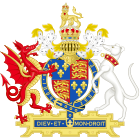Vagabonds Act 1530 facts for kids
| Act of Parliament | |

|
|
| Long title | An Act directing how aged, poor, and ... Persons, compelled to live by Alms, shall be ordered; and how Vagabonds and Beggars shall be punished. |
|---|---|
| Citation | 22 Hen. 8. c. 12 |
| Territorial extent | Kingdom of England |
|
Status: Repealed
|
|
| Text of statute as originally enacted | |
The Vagabonds Act 1530 was an important law passed in England. It was created when Henry VIII was king. This law is part of a group of rules known as the Tudor Poor Laws. These laws aimed to deal with poverty and people who wandered without a home or job. The full name of the act was "An Act directing how aged, poor and ... Persons, compelled to live by Alms, shall be ordered; and how Vagabonds and Beggars shall be punished."
Contents
What Was the Vagabonds Act?
The Vagabonds Act of 1530 was a law that tried to control people who were considered "vagabonds." These were people who did not have a fixed home or job. The law also aimed to help those who truly could not work. It was a big step in how England dealt with poverty.
Why Was This Law Created?
In the 1500s, many people in England were very poor. Some had lost their jobs or homes. Others were too old, sick, or disabled to work. These people often had to beg for money or food. The government wanted to find a way to manage this situation. They wanted to help some people but also control those they saw as simply avoiding work.
How Did the Law Treat Vagabonds?
Under this new law, people identified as vagabonds faced harsh punishments. Instead of just being put in the stocks, they could be whipped. This was a severe physical punishment. The idea was to discourage people from wandering and begging if they were able to work.
How Did the Law Help People?
Even though the law was tough on vagabonds, it also offered help. It made special rules for people who could not work. This included those who were sick, very old, or had a disability. These people were allowed to beg for help in their local area. This part of the law was new and important.
Who Was in Charge of the Law?
The Vagabonds Act made local officials, called Justices of the Peace, responsible. They had to make sure that people who truly needed help received it. They also had to deal with those who were considered vagabonds. This was one of the first times that local government played a role in helping the poor. This law is seen as an early step towards a system of social welfare in England.
 | Jackie Robinson |
 | Jack Johnson |
 | Althea Gibson |
 | Arthur Ashe |
 | Muhammad Ali |

